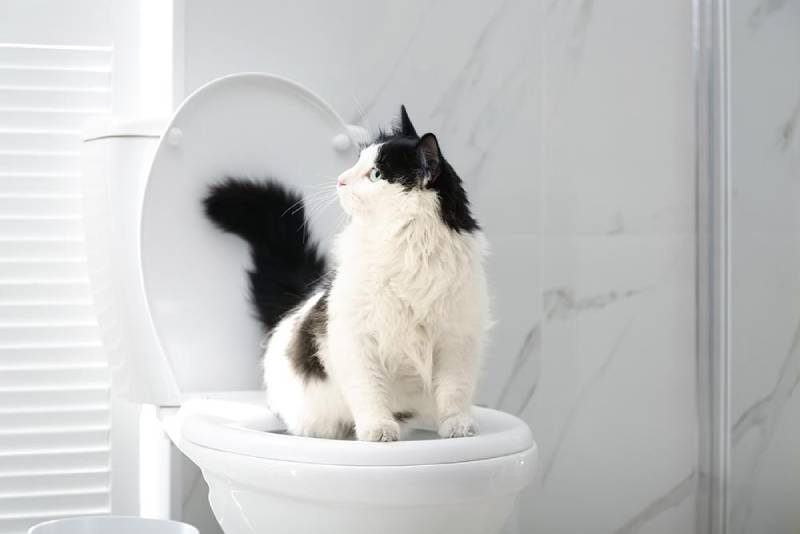Why You Mustn't Flush Cat Poop Down Your Toilet - Preserve Your Plumbing Health
Why You Mustn't Flush Cat Poop Down Your Toilet - Preserve Your Plumbing Health
Blog Article
Were you interested in help concerning Don’t flush cat feces down the toilet?

Introduction
As pet cat proprietors, it's vital to be mindful of how we throw away our feline close friends' waste. While it might seem practical to flush feline poop down the commode, this technique can have harmful repercussions for both the atmosphere and human wellness.
Alternatives to Flushing
Fortunately, there are safer and much more accountable methods to take care of pet cat poop. Take into consideration the following choices:
1. Scoop and Dispose in Trash
The most usual approach of disposing of pet cat poop is to scoop it right into a naturally degradable bag and throw it in the garbage. Make sure to use a dedicated clutter scoop and deal with the waste without delay.
2. Use Biodegradable Litter
Opt for eco-friendly cat clutter made from materials such as corn or wheat. These clutters are environmentally friendly and can be securely gotten rid of in the garbage.
3. Bury in the Yard
If you have a backyard, consider burying pet cat waste in a designated area far from veggie yards and water sources. Make sure to dig deep adequate to stop contamination of groundwater.
4. Install a Pet Waste Disposal System
Invest in an animal garbage disposal system especially created for feline waste. These systems utilize enzymes to break down the waste, minimizing odor and environmental impact.
Health and wellness Risks
Along with ecological concerns, purging cat waste can also posture health threats to humans. Feline feces may contain Toxoplasma gondii, a bloodsucker that can cause toxoplasmosis-- a potentially severe disease, especially for pregnant females and individuals with weakened immune systems.
Environmental Impact
Flushing feline poop presents hazardous microorganisms and parasites right into the water, posturing a significant risk to aquatic communities. These contaminants can negatively impact aquatic life and concession water top quality.
Verdict
Accountable family pet possession prolongs beyond offering food and shelter-- it also entails correct waste monitoring. By refraining from flushing cat poop down the commode and going with different disposal techniques, we can minimize our ecological footprint and protect human wellness.
Why You Should Never Flush Cat Poop Down the Toilet
A rose by any other name might smell as sweet, but not all poop is created equal. Toilets, and our sewage systems, are designed for human excrement, not animal waste. It might seem like it couldn’t hurt to toss cat feces into the loo, but it’s not a good idea to flush cat poop in the toilet.
First and foremost, assuming your cat uses a litter box, any waste is going to have litter on it. And even the smallest amount of litter can wreak havoc on plumbing.
Over time, small amounts build up, filling up your septic system. Most litter sold today is clumping; it is made from a type of clay that hardens when it gets wet. Ever tried to scrape old clumps from the bottom of a litter box? You know just how cement-hard it can get!
Now imagine just a small clump of that stuck in your pipes. A simple de-clogger like Drano isn’t going to cut it. And that means it’s going to cost you big time to fix it.
Parasitic Contamination
Believe it or not, your healthy kitty may be harboring a nasty parasite. Only cats excrete Toxoplasma in their feces. Yet it rarely causes serious health issues in the cats that are infected. Most people will be fine too if infected. Only pregnant women and people with compromised immune systems are at risk. (If you’ve ever heard how women who are expecting are excused from litter cleaning duty, Toxoplasma is why.)
But other animals may have a problem if infected with the parasite. And human water treatment systems aren’t designed to handle it. As a result, the systems don’t remove the parasite before discharging wastewater into local waterways. Fish, shellfish, and other marine life — otters in particular — are susceptible to toxoplasma. If exposed, most will end up with brain damage and many will die.
Depending on the species of fish, they may end up on someone’s fish hook and, ultimately on someone’s dinner plate. If that someone has a chronic illness, they’re at risk.
Skip the Toilet Training
We know there are folks out there who like to toilet train their cats. And we give them props, it takes a lot of work. But thanks to the toxoplasma, it’s not a good idea.

We were made aware of that editorial on How to Dispose of Cat Poop and Litter Without Plastic Bags through a friend on our other blog. Are you aware of another person who is intrigued by the subject? Please feel free to promote it. Thank-you for taking the time to read it.
Book Today! Report this page